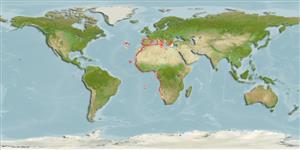Common names from other countries
>
Acropomatiformes (Oceanic basses) >
Epigonidae (Deepwater cardinalfishes)
Etymology: Epigonus: Greek, epi = over, in front + Greek, gonio = angle (Ref. 45335).
Environment: milieu / climate zone / depth range / distribution range
Ecologia
marinhas batidemersal; intervalo de profundidade 160 - 742 m (Ref. 56504), usually 200 - 400 m (Ref. 7321). Deep-water; 46°N - 29°S, 38°W - 37°E
Eastern Atlantic: western Mediterranean to the African coast except between 11°N and 6°S.
Tamanho / Peso / Idade
Maturity: Lm ? range ? - ? cm
Max length : 19.7 cm SL macho/indeterminado; (Ref. 44983)
Espinhos dorsais (total): 7; Raios dorsais moles (total): 9; Espinhos anais 2; Raios anais moles: 8 - 9. Gill rakers on first arch have the common styloid shape. Teeth are developed on the center and edges of the tongue (Ref. 31632). Snout tapering to a rounded point; eye very large, longer than high. Opercular spine pungent, bony, surmounted by one or more poorly ossified spinelets. Mouth large, lower jaw equal to or projecting slightly beyond upper jaw. Pyloric caeca 6-8. Preserved specimens are yellow-brown in color; dorsal fin membrane dark.
Occurs chiefly on the upper portion of the continental slope. Depth range from 200-600 m (Ref. 07321, 74332) and from 351-742 m in the eastern Ionian Sea (Ref. 56504, 74332). A mesobenthic-pelagic species living mainly above the bottom (Ref. 31632). Adults are strongly associated with the substrate (Ref. 4738).
Life cycle and mating behavior
Maturidade | Reprodução | Desova | Ovos | Fecundidade | Larvas
Maugé, L.A. and G.F. Mayer, 1990. Apogonidae. p. 714-718. In J.C. Quero, J.C. Hureau, C. Karrer, A. Post and L. Saldanha (eds.) Check-list of the fishes of the eastern tropical Atlantic (CLOFETA). JNICT, Lisbon; SEI, Paris; and UNESCO, Paris. Vol. 2. (Ref. 7321)
Categoria na Lista Vermelha da IUCN (Ref. 130435)
CITES (Ref. 128078)
Not Evaluated
Ameaça para o homem
Harmless
Utilização humana
Mais informação
Nomes comunsSinónimosMetabolismoPredadoresEcotoxicologiaReproduçãoMaturidadeDesovaFecundidadeOvosDesenvolvimento dos ovos
ReferênciasAquaculturaPerfil para aquaculturaEstirpesGenéticaElectrophoresesHereditariedadeDoençasProcessamentoMass conversion
ColaboradoresFotografiasStamps, Coins Misc.SonsCiguateraVelocidadeTipo de nataçãoÁrea branquialOutras referênciasCérebrosVisão
Ferramentas
Relatórios especiais
Descarregue XML
Fontes da internet
Estimates based on models
Preferred temperature (Ref.
115969): 8.8 - 14.6, mean 13.3 (based on 105 cells).
Phylogenetic diversity index (Ref.
82804): PD
50 = 0.5000 [Uniqueness, from 0.5 = low to 2.0 = high].
Bayesian length-weight: a=0.00933 (0.00536 - 0.01626), b=3.09 (2.93 - 3.25), in cm Total Length, based on LWR estimates for this species & Genus-body shape (Ref.
93245).
Nível Trófico (Ref.
69278): 3.5 ±0.5 se; based on size and trophs of closest relatives
Resiliência (Ref.
120179): Médio, tempo mínimo de duplicação da população 1,4 - 4,4 anos (Preliminary K or Fecundity.).
Fishing Vulnerability (Ref.
59153): Low vulnerability (14 of 100).
